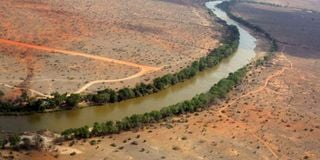Premium
State ready to hand over the Galana-Kulalu food security project to private firm

The government is preparing to hand over 10,000 acres of the expansive Galana-Kulalu food security project to private firms and the Agricultural Development Corporation (ADC) to plant maize and other cash crops to help curb food shortages.
The National Irrigation Authority (NIA), the implementer of the project, is expected to hand it over to the ADC, which will be fully in charge of commercial operations in the next few months.
The announcement comes a few days after Coast governors said they wanted the national government to allow six counties in the region to manage the 1.7 million-acre irrigation project.
The county chiefs want their Jumuiya ya Kaunti za Pwani (JKP) economic bloc, led by its chairperson Gideon Mung’aro (Kilifi), to take charge of the failed project and fight hunger in the area that has been hit hard by a searing drought.
Governors Mung’aro and Abdulswamad Nassir (Mombasa) said the counties should be allowed to take over the project, which is being undertaken in Kilifi and Tana River counties, from the ADC and NIA, claiming that the two state agencies had run down the project.
The NIA harvested about 103,000 bags of maize from the first phase of the model farm, where 5,000 acres were put under the crop, raising questions about the viability of the project.
NIA spokesperson Daniel Nzonzo said the authority is about to conclude installing irrigation infrastructure before the project is handed over.
“After an Israeli company abandoned the project due to misunderstanding with the previous administration over contractual disagreements, a Kenyan firm took over the project as other research institutes continue finding suitable crops and varieties to be planted in the area,” Mr Nzozo said.
“We are happy to say the contractor is about to conclude and less than two percent is remaining, which can be completed in a few days.”
Also Read: Hunger stalks Coast as drought bites
He added: “As it stands, we are ready to hand over the project even tomorrow to a private firm once they meet the requirements. We are expecting the current government and ministry concerned to issue the communication soon.”
The NIA said the new investor will receive a report on the best crop varieties to be planted after research institutes completed the tests.
“The NIA, with [help from] various institutions, [has] narrowed down maize varieties to three which can produce more than 30-35 bags of maize per crop. Also, other commercial crops have been tested and proven and that information is available to investors who will take over,” said Mr Nzozo.
But according to the Irrigation Act 2019, county governments might be barred from running the expansive farm because the law only allows them to run irrigation farms of less than 100,000 acres.
For a county to be allowed to run an irrigation project, it must form irrigation development boards and none of the 47 counties have any, the NIA says.
Mr Nzozo said the first contractor, Israel’s Green Arava, had set up infrastructure for 5,100 acres before the NIA took over the project and began implementing it jointly with Kenyan contractor Irrico International.
Also Read: Galana Kulalu panacea for hunger disease
Irrico International is putting up the infrastructure for Sh800 million, which is lower than the Sh5 billion spent by the Israeli company.
The Galana-Kulalu project was a key feature of the Jubilee government’s plans for food security, one of four pillars of President Uhuru Kenyatta’s agenda.
Its key mandate was to move Kenya from rain-fed agriculture amid unreliable weather patterns caused by climate change.
The government, through the NIA, is using irrigation to open new projects in arid and semi-arid areas and raise food production.
In Galana, the target was to immediately develop 500,000 acres of the vast Galana-Kulalu ranch that covers 1.75 million acres but with the irrigation potential estimated to be 1.2 million acres.
Under irrigation, the government intends to plant maize on 4,685 acres under centre pivot, 4,365 acres under drip, 900 acres of open-field vegetables under drip, and 50 acres of greenhouse vegetables under drip irrigation.





